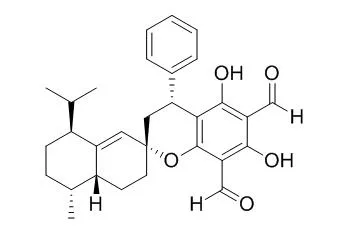Psidium guajava L., a species native to South America, has been widely cultivated in the tropical and subtropical areas of China for its popular fruits.
METHODS AND RESULTS:
The preliminary analysis by liquid chromatography-ultraviolet (LC-UV) indicated the presence of meroterpenoids in the fruits of P. guajava (guava). Subsequent fractionation of the petroleum ether extract resulted in the identification of two new meroterpenoids, psiguajavadials A (1) and B (2), together with 14 previously described meroterpenoids (3-16, including guajadial A, guajadial B , Guajadial C , guajadial D, guajadial E and guajadial F). Their structures were fully elucidated by comprehensive spectroscopic techniques and theoretical calculations. All of the meroterpenoids showed cytotoxicities against five human cancer cell lines, with guajadial B (12) being the most effective having an IC50 value of 150 nM toward A549 cells. Furthermore, biochemical topoisomerase I (Top1) assay revealed that psiguajavadial A (1), psiguajavadial B (2), guajadial B (12), Guajadial C (14), and guajadial F (16) acted as Top1 catalytic inhibitors and delayed Top1 poison-mediated DNA damage. The flow cytometric analysis indicated that the new meroterpenoids psiguajavadials A (1) and B (2) could induce apoptosis of HCT116 cells.
CONCLUSIONS:
These data suggest that meroterpenoids from guava fruit could be used for the development of antitumor agents. |






 Cell. 2018 Jan 11;172(1-2):249-261.e12. doi: 10.1016/j.cell.2017.12.019.IF=36.216(2019)
Cell. 2018 Jan 11;172(1-2):249-261.e12. doi: 10.1016/j.cell.2017.12.019.IF=36.216(2019) Cell Metab. 2020 Mar 3;31(3):534-548.e5. doi: 10.1016/j.cmet.2020.01.002.IF=22.415(2019)
Cell Metab. 2020 Mar 3;31(3):534-548.e5. doi: 10.1016/j.cmet.2020.01.002.IF=22.415(2019) Mol Cell. 2017 Nov 16;68(4):673-685.e6. doi: 10.1016/j.molcel.2017.10.022.IF=14.548(2019)
Mol Cell. 2017 Nov 16;68(4):673-685.e6. doi: 10.1016/j.molcel.2017.10.022.IF=14.548(2019)